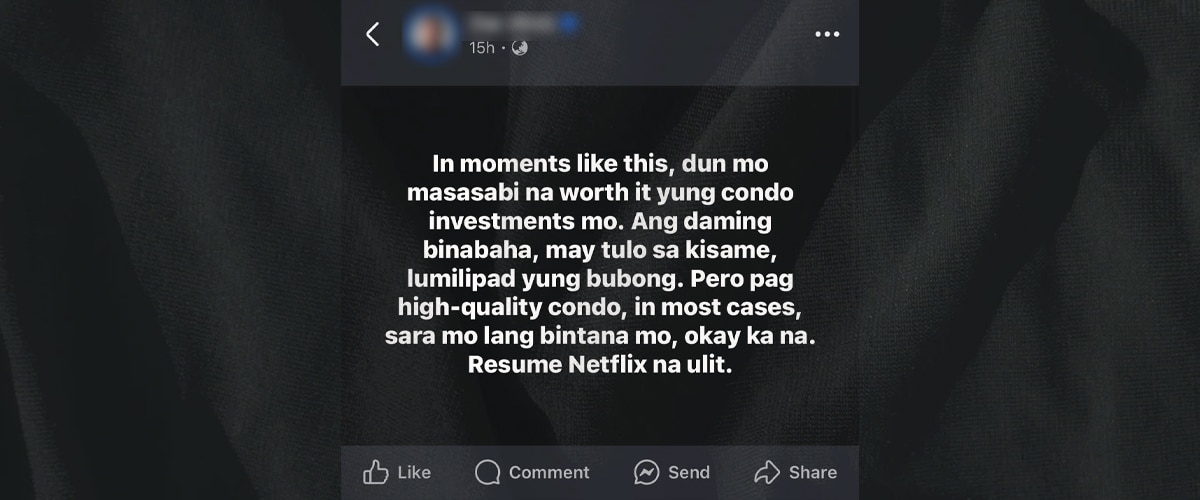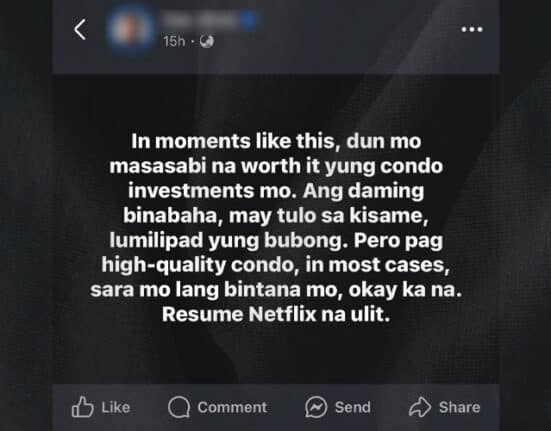WE’RE already made guilty for sleeping in. For taking breaks. For not turning every waking hour into some sort of revenue stream.
Many of us have come across a post—often from a self-proclaimed ‘alpha male’ influencer—ranting about how poverty is a personal failure. They frame rest as laziness and insist that poverty is simply a mindset problem waiting to be fixed.
Now, this brand of motivational mockery resurfaces—this time exploiting the disaster brought on by the recent torrential rains in the Philippines.
Over the week, several posts from a Facebook influencer turned viral for all the wrong reasons.
While storm alerts blared and entire barangays sank underwater, with families trapped in flooded homes and commuters stranded for hours, one content creator decided it was the perfect moment for a “teachable” moment.
In a now-deleted Facebook post, the self-styled motivator told people to treat the disaster as inspiration—to hustle harder, earn more, and rise above their soggy circumstances. As if poverty were just a matter of mindset.
In another tone-deaf flex, he humblebragged about his “condo investment,” proudly claiming he could sit comfortably, watch and chill with his Netflix—unbothered, unlike those of us who had to deal with flooded-in homes.
The implied message was clear: if you’re suffering, it’s because you didn’t work hard enough to avoid it.
In a time of national disaster such as this, this was tone-deaf. It’s a moral posturing disguised as self-help, a performative discipline that disregards other factors. and reduces a complex web of systemic neglect, environmental collapse, and poverty into a simplistic, individualistic narrative: that you either grind or you drown.
Although the influencer has since issued a public apology, it doesn’t erase the fact that figures like him have long been instrumental in spreading and normalizing this kind of dangerous thinking.
Their content helped popularize a worldview that blames the individual instead of interrogating the unjust systems we live under.
The problem with this thinking
This incident is just one example of a growing cultural narrative that confuses exploitation with empowerment.
Hustle culture, in its most toxic form, convinces people that the only thing standing between them and their success is their willingness to suffer. It frames rest— a basic need— as laziness.
It insists that the right attitude can overcome anything—even government negligence, corporate greed, or generational poverty.
But this logic doesn’t just flatten reality— it actively ignores it. It refuses to acknowledge how economic inequality, poor urban planning, and climate vulnerability intersect to make some communities disproportionately suffer during disasters.
It suggests that if you’re poor during a typhoon, it’s your fault for not working hard enough—never mind that you may have been born into a cycle of poverty, that you live paycheck to paycheck, that the system was never designed to work for you in the first place.
This mindset isolates and shames the most vulnerable, pressuring them to accept without a question the exploitation of big corporations and corrupt politicians. It teaches them to internalize blame rather than demand public accountability and systemic change.
The privilege behind the tone-deaf motivational content
There’s a certain kind of blindness that comes with privilege. One that allows someone to witness a national emergency and still turn the cameras toward themselves.
That’s what happened here.
Even if the influencer claims to understand others’ suffering—or insists they’ve been through it themselves—that doesn’t give them the right to sermonize or turn a disaster into a stage for their performative discipline.
Whether they realize it or not, the privilege of their current situation has created a blind spot—one that distorts how they perceive and speak about the issue. This happens when they surround themselves with echo chambers—where their lived reality is treated as the default and others’ suffering becomes anecdotal at best, invisible at worst.
It’s easy to preach “mind over matter” when your matter is a high-rise condo, not a knee-deep flood in a one-bedroom unit shared by six.
This isn’t just about being insensitive— it’s about being detached. And this detachment has consequences.
When people with large platforms reinforce this narrative, they help build a culture where structural violence is normalized and even blamed on personal failures.
The difference between empowering the marginalized and shaming them
What makes posts like this particularly insidious is that they don’t exist in a vacuum. It echoes a larger cultural obsession with self-made success stories, often repackaged into quick content.
But in a country where millions have no choice but to work multiple jobs to survive, this isn’t motivation— it’s gaslighting. It leads us to believe that anything less than constant productivity is not just laziness but a moral failure. That if you can’t afford to retreat to your condo, then you didn’t just work hard enough. That your suffering is deserved.
When we glorify these narratives, we don’t uplift others. We trap them into a system that promises salvation through suffering. And worse, we let those responsible off the hook.
The government doesn’t need to improve flood infrastructure. Employers don’t need to provide paid disaster leave. After all, the people just need to “work harder,” right?
We deserve better than that. We deserve more than motivational posts that mistake privilege for wisdom and punishment for discipline. We deserve safety, dignity, and a culture that sees people as more than their productivity.
Because if we don’t push back against this narrative, we’ll keep telling people to hustle their way out of drowning—when what they really need is a lifeboat.
How useful was this post?
Click on a star to rate it!
Average rating 5 / 5. Vote count: 1
No votes so far! Be the first to rate this post.
We are sorry that this post was not useful for you!
Let us improve this post!
Tell us how we can improve this post?




